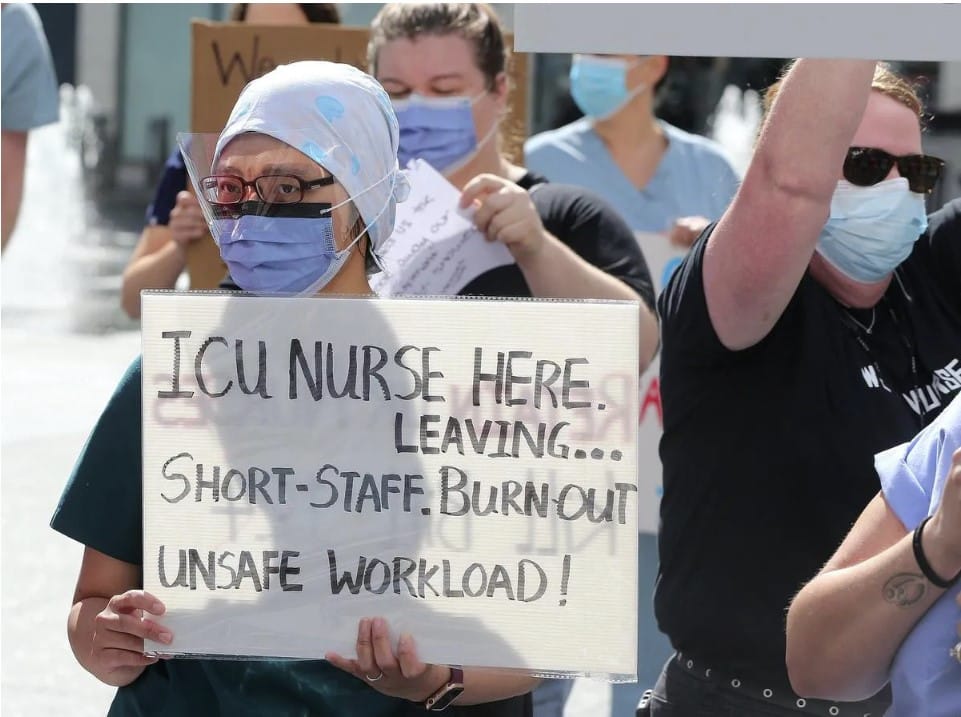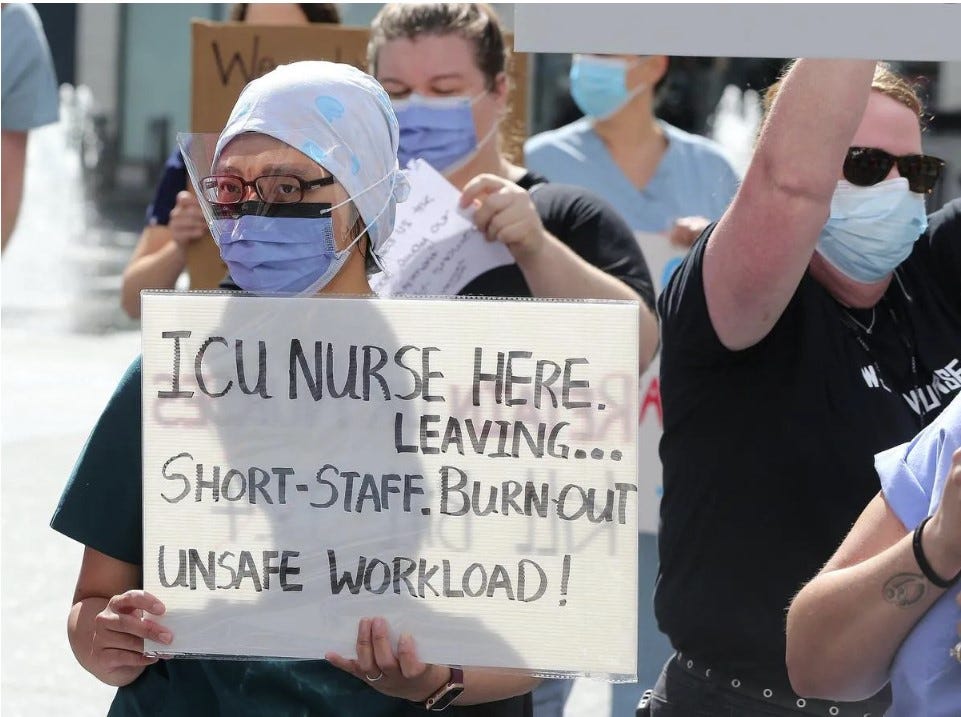Bill 124 was written to enrich healthcare staffing agencies
Putting the healthcare workforce into private hands sets the stage for private hospitals

Last week, the Toronto Star’s Queen’s Park reporter, Rob Ferguson, wrote about the use of “temporary nurses” in Ontario hospitals, noting that Liberal MPP Adil Shamji had asked the Auditor General for a “value-for-money” audit, citing price gouging. Last month the AG reported that Ontario hospitals and nursing homes are over-reliant on expensive staffing agencies.
In addition to credulously running some dubious claims from the Minister of Health’s spokesperson that Ontario hospitals are actually using fewer agency nurses than in the past, the article included a call from NDP leader, Marit Stiles, to cap pay for agency nurses at 10 percent above hospital rates. (According to the ONA, Ontario hospitals spent more than $168 million on agencies in the first three quarters of 2022, a 341% increase over $38.1 million spent in all of 2020-21.)
By framing the issue in this way, including no voices advocating to ban the use of private agencies (and not mentioning that Quebec passed a law banning their use by the end of next year), Ferguson and the Star (and the NDP) did nursing agencies a solid, reinforcing the idea that agencies are a necessary evil, an unfortunate byproduct of the struggling public system.

In reality, Bill 124, wage suppression legislation passed by the Ford government in 2019, was written to enrich and strengthen private healthcare staffing agencies. Indeed, the concentration of agencies owned by senior conservatives, their families and donors is noteworthy. Mike Harris Sr. and his wife, Lauren, opened one in 2012, for example. (At the same time, Harris was chairing the board of private long term care operator Chartwell, having made private long term care legal in Ontario as premier.)
Bill 124 was declared unconstitutional in 2022 by an Ontario superior court judge, but is still in force as Team Ford files an appeal, with hearings still ongoing. By severely limiting wage increases to a maximum of 1% for three years, the Ford government handed private nursing agencies a gift, meaning they didn’t have to offer much in order to improve on their pay. At the same time, the government was strategically starving hospitals of funds in order to make sure the remaining hospital workforce would be stressed and overworked, in addition to being underpaid.
By the time Mike Harris left office in 2002, the long game to privatize healthcare in Ontario was already underway, and the introduction of private, long term care was a key pillar as it spurred a flurry of private agencies offering personal support workers.
Making Ontario’s public hospitals into for-profit hospitals will be the jewel in the privatization crown for Team Ford and the investors lined up to profit. In that regard, the Ford government has made great progress. Last winter, Ottawa’s largest hospital allowed a surgeon-run corporation to use its operating rooms for orthopedic surgeries. On January 10th, the Minister of Health announced an expansion of private clinics that can offer publicly-funded tests and procedures like MRIs, hip and knee replacements.
The Ford government’s goal for Ontario hospitals (soon to be for-profit entities) is to have them employ no clinical staff at all, with all clinical roles being supplied by agencies. This is effective union busting, for both hospitals and the government. Healthcare workers from agencies have no union, meaning they enjoy fewer worker protections, and they don’t get benefits or a pension. By deploying healthcare workers in this way, Ontario essentially turns highly educated, highly skilled, unionized healthcare workers into gig workers and contract workers.
Healthcare workers, for now, make more money working for an agency, but go without benefits or a pension. Once full-time staff positions don’t exist in hospitals anymore, and agencies have monopolized the market, history shows that agencies will squeeze what they pay healthcare workers to juice their profits. With no union protection, agency healthcare workers will have no organized labour to protect them or fight back against what private agencies impose on them.
The deplorable state of Ontario hospitals has been strategically cultivated via Bill 124, and the pandemic was an additional gift for the government and private care lobbyists. Team Ford is counting on dire conditions in hospitals in order to make Ontarians more susceptible to lies and misinformation about privatization. Specifically, Team Ford hopes Ontarians will believe that introducing profit into this system will make it all better, despite no evidence to support the claim and a mountain of evidence indicating otherwise. In the meantime, terrible working conditions and moral injury for healthcare workers in the public system is a highly effective recruitment tool for agencies. (Private agencies wait in parking lots to recruit workers coming off their latest depressing, stressful shift.)
As we can see already with the involvement of Telus, Loblaws and the banks, private, for-profit healthcare here will be dominated and monopolized by the same oligarchs and mega-corporations holding Canadians hostage in so many industries already, such as telecommunications, banking and groceries. The rise of private healthcare staffing companies will, inevitably, evolve into a wave of “consolidation” as well, eventually putting our entire healthcare workforce into the same few wealthy hands.
Corruptario by Jordan Roberts & Friends is a reader-supported publication. To receive new posts and support my work, consider becoming a free or paid subscriber.
